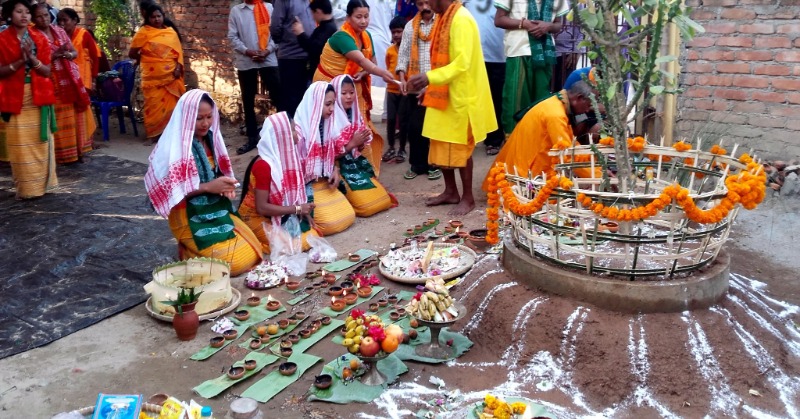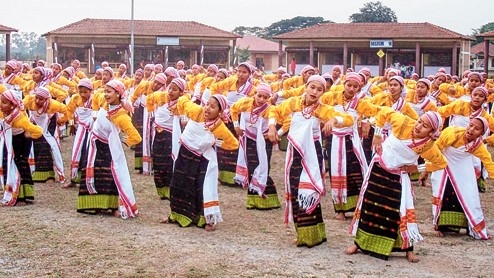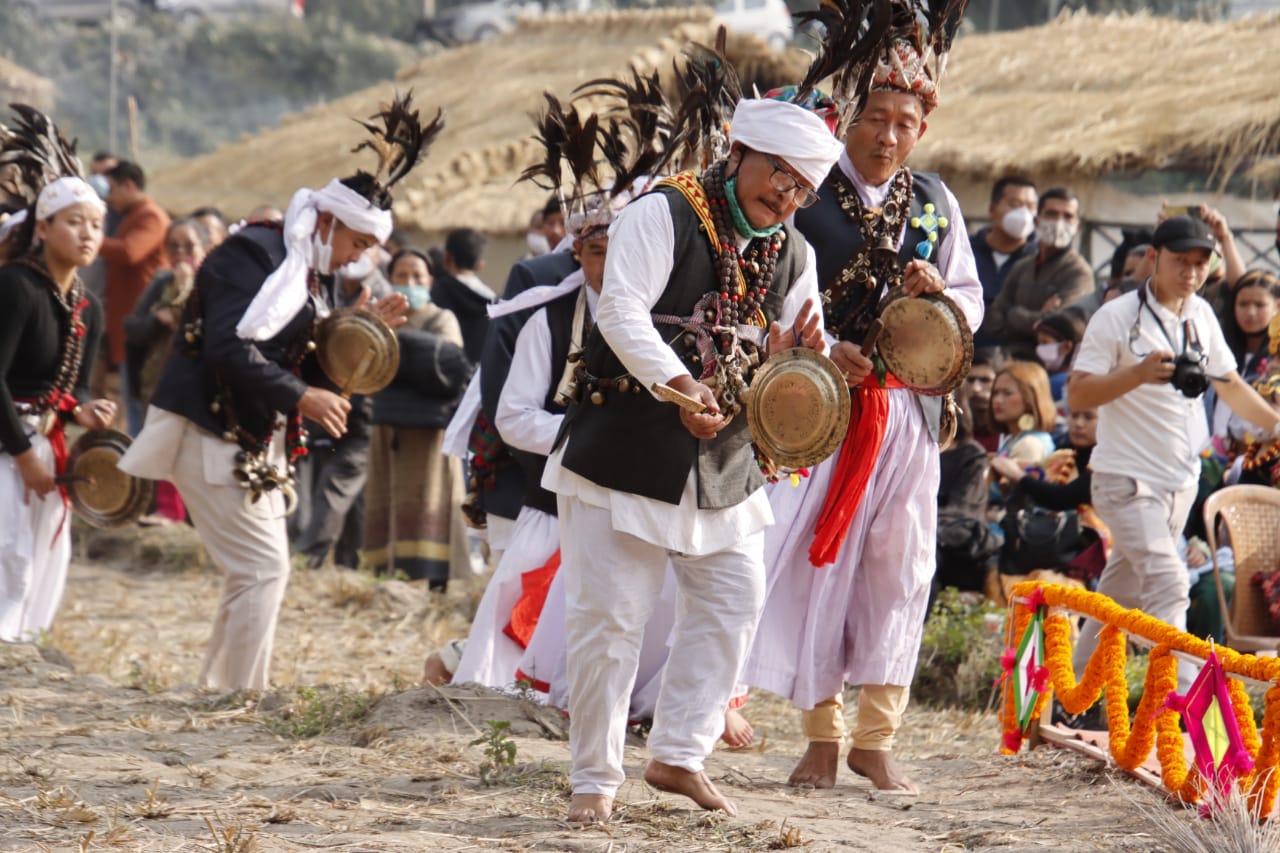By Taren Boro
Before discussing the topic, it would be better to consider certain historical aspects of the ethnic identity growth and assimilation medium of expression, culture and tradition, faith and religion, socio-economic and above all racial aspiration. It is true that the material progress advised by theBodos right from the habit of hunting, food gathering, and tool making of stone to cooking, clothing and housing has taken a long travel in India. Bodos can introduce themselves racially, politically, religiously, socially and linguistically and also as well as from the foundation of mythology, Bodos are considered sons of lord Shiva and is prayed by Bodos as Shiv Bwrai means welcoming Shivato their household so that he maycreate all possible conditions of happiness protection, pride, prosperity and well-being of the house. The beliefs of Aryan theory also accept Shiva as their powerful deity.
There are a number of gods and deities in Bodos who are also accepted by the Aryans as their gods and deities. Bathou is the creator of the universe including all these gods and goddesses, deities and other things which originated with Bodo people in India. The Bodos bestowed divinity in each part of nature and art, still holding that their supreme god is only one, the Bathoubwrai. Thus, all rivers’ mountains celestial bodies and natural forces are gods to the Bodos whom they had taken to worship for their well-being and survival. Nonetheless, their supreme deity has been Bwrai Bathou who is installed in each family and he manifests himself in the form of Euphorbia (the Siju tree) among them.
In order to pacify their god, the Bodos did offer multifarious objects including sacrifices of animals namely fowl, pig, pigeon and goat to their gods out of faith in gods.
As regards the social study of the Bodos, they were hardly given their due and proper recognition in the Hindu society in India. They were very often discriminated against, de-humanized and castigated in all aspects of life and living which were enough to demoralise even a strong society of high culture. The Bodos were again branded as animists as if they were only the ones, none else in India who attribute conscious life to objects and phenomena of nature. On some flimsy grounds, inter alia that followed the principle of Deism, i.e., a system of thought advocating natural religions based on human morality and reasons rather than divine revelation.
It is very interesting to note that some scholars like to say that Bodos are animists in regard to religion. But Bodos are not animistic basically. They are the worshippers of Bathou the supreme god, which means the five great elements: earth, air water, sun and sky. The entire universe is run by him, controlled, guided and maintained by him only each of the creatures is created with the help of all these five elements and none can survive without them. The Bathou is taking in such a direction where fear,respect hope,worship,salvation,and virtue are altogether guiding its philosophy. Do not harm others, do not commit sin and not do wrong things are the fear factors which they use to believe that if some are to commit sin and act the almighty or deity of his household will punish him resulting some disastrous to him and his family members.
Bodo people also exercised and practisedthe tantra mantra since the beginning and are still found particularly in villages.
These mantras and tantras can be used for good and bad purposes. Some sections of illiterate Bodo people perhaps the bad side of the game were used mostly termed as a witch (Dyna) game. Science may or may not follow this game, however,it is a powerful,miracle and is believed effective at its own cause.
The great Bodo people also perform some natural pujas and it is belief through this natural puja, peace and happiness will derive in the location and village.Bodos mainly perform the kherai festival, garja, langamara and bhasani puja in various forms just to satisfy the divine forces and to get rid of any natural calamity. Even during the Kherai puja a particular woman called doudini performs dances. During her dance for some time, she loses her consciousness and is overpowered by some unseen power and can narrate the present,past and future and even the reasons behind it.This is the peculiar situation and performance and how Bodosbelieve such a natural element. We the Bodos term her as a fortune teller. Over and above, Bodo people had been worshipping the big stone and unnatural trees and rivers. People believe these are the creatures of God where God and goddesses may stay over the locations.When anybody crosses the river, they offer betel nuts on the bank of the river to satisfy the river god praying so that he or she can cross easily without any hindrances and fear.People think that the god might have shelter under the trees and at the big stones.This has been the tradition for Bodo people. There is a belief that before fishing in a river Bodo performs puja and reminds Magur and Maguri two old men and woman the owner of the river so that no hindrances are received at the fishing time.
At the time of hunting also, Bodos offers some sort of puja to satisfy the forest god i.e. (hagranimwdai) so that the owner of the animals cannot attack or deny. In this way, Bodos believed in hundreds of nature gods and goddesses. Bodos also perform puja during the time of Baisag month and Ahar month just to satisfy Barun Devota (Winds god) and water god (Dwimanimwdai) so that regular rains come during the cultivation time and storms, natural calamities may not come and no loss of agricultural paddy and human life. Bodos also believes that the building of the house should be in a proper location so that some unwanted incidentscannotoccur in the family. Bodos selected the location (vita) where the house and courtyard were to be made. There are proverbs for the homestead of the Bodo Kacharies and Assamese families’proverb:
Bamboos on the western side, a pond on the east; betel nut trees on the northern side and a kitchen on the south.
The meaning is that Assam of the plains depends on the geographical condition. The intensity of the storm blowing from the west is very strong. The bamboos on the homestead's western side check the storm's ferocity. Besides, bamboo is an essential element of the life and culture of the Bodo-Kacheri and the Assamese.
Besides building houses with bamboo, it is also used for making things of day-to-day use such as — kula, panchi, kharahi,chaloni, chepa, chahara, polo, speans etc. These are used for fishing and hunting also.
There should be a river, a beel or at least a pond on the eastern side. There will be gees on the ponds and people will get eggs and meat from these gees.
Like bamboo betel nut and betel leaf have an important place on the life of Bodo as well as Assamese family. It is indispensable in marriages, meetings and other ceremonies, even a crime doer gets his punishment lessened by offering `tamol - pan. Besides it is a good source of income. So, the proverb advises to plant `tamol- pan on the northern side.
The southern side of the stead should be kept open sunshine. In this way, the great Bodo race followed the natural forces and beliefsand prayedto the Almighty for their peace and happiness. TheBodos originally did not believein the Idol (rainy) pujas but at present some sections of the Bodo family bestow and perform Idol puja for their mental satisfaction, happiness and peace in the family.






